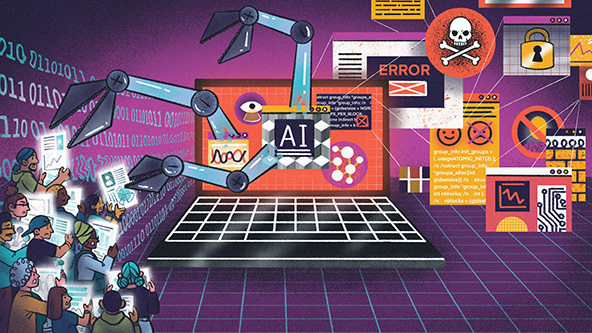Navigating the Ethical Landscape: The Responsible Use of AI in University Environments

In recent years, the integration of Artificial Intelligence (AI) into various facets of university life has become increasingly prevalent. From optimizing administrative processes to enhancing educational experiences, AI holds the potential to revolutionize how universities operate. However, as universities embrace this transformative technology, it becomes imperative to navigate the ethical considerations that come with its deployment. This article delves into the ethical dimensions of using AI in the university environment, exploring the challenges and opportunities it presents.
1. Ethical Implications of Student Data:
One of the primary ethical concerns in deploying AI in university settings revolves around the collection and usage of student data. AI systems often rely on vast datasets to operate effectively, raising questions about the privacy and security of sensitive student information. Universities must prioritize transparent data policies, informed consent, and robust cybersecurity measures to ensure the ethical handling of student data.
2. Fairness and Bias in AI Algorithms:
AI algorithms, if not carefully designed and monitored, can perpetuate or even exacerbate existing biases. In the university context, this could manifest in admissions processes, grading systems, or student support services. Ensuring fairness in AI algorithms requires continuous scrutiny, regular audits, and the incorporation of diverse perspectives to mitigate bias and promote equal opportunities for all students.
3. Academic Integrity and AI:
AI-powered tools designed to prevent plagiarism and uphold academic integrity raise ethical questions related to student autonomy and the learning process. Striking a balance between maintaining academic rigor and respecting students’ intellectual growth is crucial. Universities should establish clear guidelines on the use of AI tools for plagiarism detection, emphasizing education over punitive measures.
4. Accountability and Transparency:
As universities adopt AI solutions, the need for accountability and transparency becomes paramount. Faculty, students, and administrators should have a clear understanding of how AI systems operate and make decisions. Establishing transparency ensures that the university community can trust the technology and hold it accountable for its outcomes.
5. AI in Educational Decision-Making:
Using AI to inform decisions related to student success, course recommendations, and resource allocation introduces ethical considerations. The university must ensure that AI-driven decisions align with educational goals, uphold fairness, and prioritize the well-being of students. Human oversight and intervention remain critical to prevent undue reliance on AI in shaping important academic and administrative decisions.
6. Accessibility and Inclusivity:
While AI has the potential to enhance accessibility for students with diverse learning needs, there is a risk of exacerbating disparities if not implemented thoughtfully. Universities must prioritize the inclusivity of AI solutions, ensuring they cater to a broad spectrum of learners and do not inadvertently disadvantage certain student groups.
7. Ethical AI Education:
Integrating ethical considerations into AI education becomes essential for fostering responsible practices among students and faculty. By incorporating discussions on the ethical implications of AI into curricula, universities can empower individuals to navigate the complexities of AI technology ethically and responsibly.
8. Continuous Ethical Oversight:
Given the rapid evolution of AI technologies, universities must establish mechanisms for continuous ethical oversight. Ethical review boards, composed of diverse stakeholders, can play a crucial role in evaluating the impact of AI applications, revising policies, and ensuring alignment with evolving ethical standards.
The integration of AI into university environments brings forth numerous advantages, universities must approach this transformation with a keen awareness of the ethical dimensions involved. By prioritizing transparency, fairness, accountability, and inclusivity, universities can harness the potential of AI while upholding the values of integrity, equity, and responsible innovation within the academic community. Ethical AI adoption in universities is not just a compliance measure but a commitment to nurturing an environment that values both technological advancement and ethical principles.

